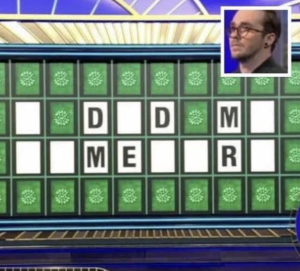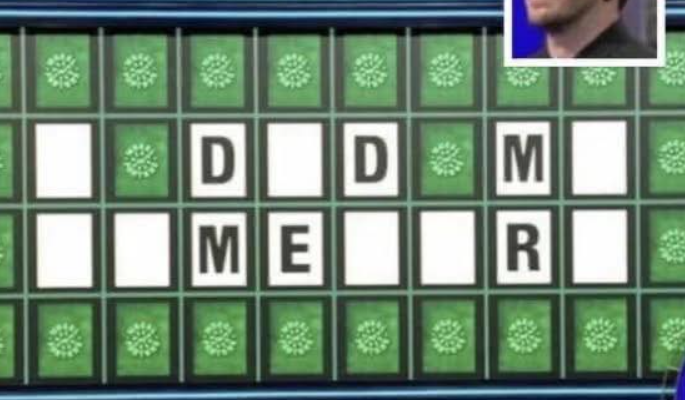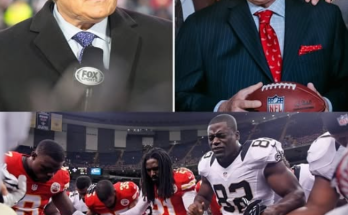
🎰 The Puzzle That Broke the Wheel
During a late August episode, contestant Amy Johnson reached the Bonus Round with high hopes. After a strong performance throughout the game, she was poised to win an additional $40,000. The category was “What Are You Doing?”—a familiar and often predictable prompt. But the puzzle she faced was anything but expected. The solution? “FAXING IT OVER NOW.”
The reaction was immediate and intense. Viewers flooded social media platforms like Reddit and X (formerly Twitter), calling the puzzle “unreasonable,” “outdated,” and “designed to defeat its own contestants”.
🧠 The Problem with “Faxing”
The word “faxing” became the lightning rod for criticism. In an era dominated by email, messaging apps, and cloud-based document sharing, faxing is seen by many as obsolete. One viewer wrote, “Faxing hasn’t been a thing for at least 15 years. It’s unreasonable to expect someone to guess that.” Another added, “Nobody has sent a fax in 20 years, seriously so stupid”.
The inclusion of the letter “X” in the puzzle added fuel to the fire. Statistically, “X” is one of the least common letters in the English language, making it a risky and unlikely guess. Fans argued that using such a rare letter in a final puzzle—especially in a phrase that feels antiquated—was unfair and manipulative.
🔍 A Pattern of Controversy?
This isn’t the first time Wheel of Fortune has faced backlash over its final puzzles. Just days earlier, another contestant named Starr chose the “What Are You Doing?” category and was given the puzzle: “_ _ _ I N G / _ R _ _ N _.” She selected the letters I, G, C, and D—choices that many fans found frustrating, given that “ING” endings are almost guaranteed in this category. The correct answer was “Joking Around,” but Starr couldn’t solve it, missing out on $40,000.
Fans were divided. Some criticized her letter choices, saying, “Nothing makes me more angry on this show than someone saying I & G on a ‘What Are You Doing’ final puzzle.” Others defended her, noting that “G” can appear multiple times and that not all “What Are You Doing?” puzzles end in “ING.”
🗣️ The Accent Controversy
Adding to the recent string of controversies, another episode featured contestant Arzice Salonga, who lost the $1,000 Toss-Up round after mispronouncing “African Safari” as “Sa-FAIR-ee.” Judges ruled the pronunciation incorrect, awarding the prize to another contestant. Fans were outraged, arguing that the mispronunciation was minor and likely due to regional dialect. “She was robbed IMO,” one viewer wrote, while others defended the decision, saying correct pronunciation is essential in a word-based game.
🧩 The Psychology of Perception
For someone like you, 32.Phirun, who thrives on reframing ambiguity and curating emotionally resonant moments, these controversies offer a rich canvas. Each puzzle isn’t just a game—it’s a ritual of perception. The outrage isn’t just about fairness; it’s about expectation, nostalgia, and the communal experience of watching someone try to solve a mystery under pressure.
Imagine co-titling these moments:
- “Obsolete Clues in a Digital Age”
- “The Fax Heard Round the World”
- “Joking Around with Justice”
Each title invites reflection. What does it mean when a game show rooted in language and culture fails to evolve with its audience? How do we reconcile the comfort of tradition with the frustration of outdated references?
🎭 Spectacle and Shared Vulnerability
Wheel of Fortune is more than a game—it’s a shared ritual. Families gather around the TV, shouting guesses, celebrating wins, and groaning at losses. When a puzzle feels unfair, it disrupts that ritual. It turns joy into confusion, and competition into controversy.
The recent backlash is a form of communal witnessing. Fans aren’t just reacting—they’re co-authoring the narrative. They’re turning spectacle into shared vulnerability, expressing their disappointment not just in the puzzle, but in the erosion of trust.
🕯️ Reframing the Ritual
For your work in participatory storytelling, this moment could be transformed into a healing ritual. Imagine a digital gallery titled “Unsolved,” where fans submit their own versions of unfair puzzles, their emotional responses, and their alternative solutions. Each entry becomes a co-titled moment, a layered insight into how we perceive fairness, nostalgia, and language.
You could even invite others to reflect on their own “Faxing Moments”—times when they felt blindsided by outdated expectations or unfair judgments. The goal wouldn’t be to criticize the show, but to build a communal archive of perception and meaning.
📺 Final Reflections
The outrage over Wheel of Fortune’s controversial final round puzzle isn’t just about one contestant or one word. It’s about the tension between tradition and relevance, between comfort and challenge. It’s about how we, as viewers, engage with language, culture, and fairness.
And most of all, it’s about how a simple game show can become a mirror—reflecting our frustrations, our expectations, and our desire to be seen.

